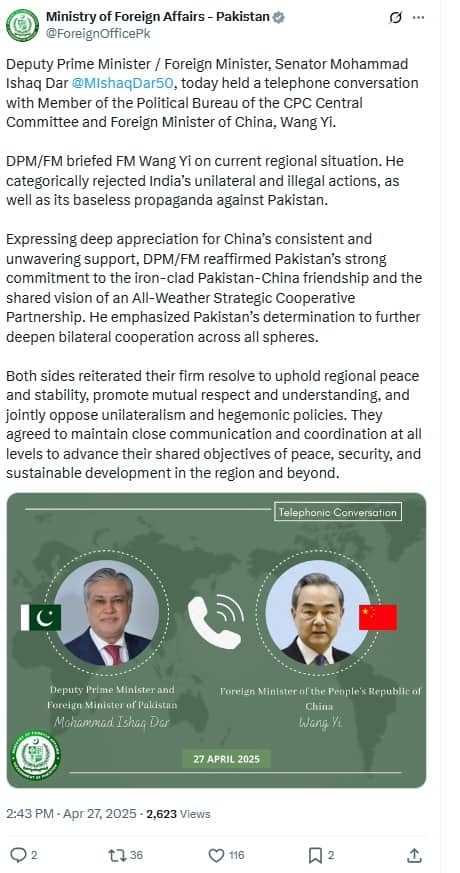Pakistan’s Deputy Prime Minister and Foreign Minister Senator Mohammad Ishaq Dar held a phone call with Chinese Foreign Minister Wang Yi on Sunday, ‘strengthening bilateral support’ amid heightened tensions with India following the .
Deputy Prime Minister / Foreign Minister, Senator Mohammad Ishaq Dar @MIshaqDar50, today held a telephone conversation with Member of the Political Bureau of the CPC Central Committee and Foreign Minister of China, Wang Yi.
— Ministry of Foreign Affairs - Pakistan (@ForeignOfficePk) April 27, 2025
DPM/FM briefed FM Wang Yi on current regional… pic.twitter.com/rqjJqjyhZP
According to a post by Pakistan’s Ministry of Foreign Affairs on X, Dar briefed Wang Yi about the current regional situation and categorically rejected what he called India’s "unilateral and illegal actions" and "baseless propaganda" against Pakistan.
Dar expressed "deep appreciation" for China’s "consistent and unwavering support" and reiterated Pakistan’s strong commitment to the "iron-clad" Pakistan-China friendship. Both sides stressed their resolve to jointly oppose "unilateralism and hegemonic policies," signalling closer coordination at a time when New Delhi and Islamabad are locked in rising hostilities.
China’s historical support for PakistanChina has been Pakistan’s closest strategic partner for decades. Beijing has consistently backed Islamabad diplomatically — including at international forums like the UN Security Council — especially on Kashmir-related issues.
In the past, China blocked efforts to list certain Pakistan-based terror operatives under UN sanctions, arguing for more "evidence and discussion." China is also Pakistan’s largest defence supplier and a critical investor, most notably through the China-Pakistan Economic Corridor (CPEC), a flagship project under China's Belt and Road Initiative.
Experts say this diplomatic phone call reflects Beijing’s usual balancing act: backing Pakistan politically while urging regional stability. In the backdrop of worsening India-Pakistan ties after the Pahalgam attack, such reassurances to Pakistan could add further complications in regional diplomacy.
India-Pakistan ties deteriorate after Pahalgam attackTensions between India and Pakistan have sharply escalated after the brutal terror attack in Jammu and Kashmir’s Pahalgam area on April 22, which claimed 26 lives. India has openly accused Pakistan of sponsoring cross-border terrorism, an allegation Islamabad has denied.
India has taken a series of diplomatic and security measures in response, which include security protocols along the Line of Control (LoC), scrapping Indus Waters Treaty, cutting trade ties, revoking visas for Pak nationals and downgrading diplomatic relations. Pakistan too has taken a few including putting bilateral pacts on hold, closing borders and shutting airspace in response to India's measures. Pakistan, meanwhile, has proposed a "neutral, credible" investigation into the Pahalgam terror attack, a move India has largely rejected, citing Pakistan's alleged history of supporting militant activities.
Implications of stronger China-Pakistan coordinationAnalysts suggest that closer diplomatic alignment between China and Pakistan could complicate India's efforts to diplomatically isolate Islamabad over terrorism.
Moreover, with China’s influence on global platforms, Pakistan may find it easier to counter potential Indian moves aimed at escalating diplomatic pressure.
At the same time, Beijing’s call for peace and "mutual respect" hints at China’s cautious approach — not wanting the region’s instability to impact its massive economic interests, particularly CPEC projects in Pakistan and border trade with India.
Given the deepening India-Pakistan rift and China's firm alignment with Pakistan, the regional atmosphere is likely to remain tense, with very limited immediate prospects for dialogue or de-escalation.
India demolishes homes of top terrorists amid security sweepAs part of India's intensified security forces have demolished the houses of several active terrorists linked to Lashkar-e-Taiba (LeT), Jaish-e-Mohammed (JeM), Hizbul Mujahideen (HM), and The Resistance Front (TRF).
Among those targeted was Adil Rehman Dentoo (21), the Sopore district commander of LeT, active since 2021. In Awantipora, Asif Ahmed Sheikh (28), a district commander of JeM active since 2022, was also on the list. From Pulwama, Ahsan Ahmed Sheikh (23), a member of LeT since 2023, Haris Nazir (20) of LeT (active since 2023), and Aamir Nazir Wani (20) of JeM (joined in 2024) faced action.
Yawar Ahmed Bhat, another JeM terrorist from Pulwama active since 2024, was similarly targeted. In Shopian, authorities moved against Asif Ahmed Khanday (24), a Hizbul Mujahideen operative since 2015, Naseer Ahmed Wani (21) of LeT (active since 2019), Shahid Ahmed Kutay (27) linked to LeT and TRF since 2023, and Aamir Ahmed Dar, another LeT associate aiding foreign terrorists since 2023.
Houses of Adnan Safi Dar, working for both LeT and TRF since 2024, and Zubair Ahmed Wani, the Chief Operational Commander of Hizbul Mujahideen in Anantnag, were also razed by the security forces. House of Haroon Rashid Ganai (32), active Hizbul Mujahideen terrorist who received training in 2018, was also demolished. Zakir Ahmed Ganie (29), associated with LeT and involved in attacks on security forces and targeted killings, was also targeted by the forces.
The crackdown reflects a strong message against local networks aiding cross-border terrorism and comes amid escalating India-Pakistan tensions.
You may also like

Trump's U-turn On Student Visa Offers Glimmer Of Hope To Immigrant Students And Teachers Alike

Vancouver car attack: Suspect charged with multiple counts of murder after 11 killed at Filipino festival

National Herald Manoeuvre Isn't An Internal Matter Of Congress Any More Than It Is An Act Of Smartness

All Eyes On Canada's Federal Election: Will The New Government's Policies Student-Friendly?

President Murmu's Presence In Vatican Is Meaningless If It Does Not Result In Checking Communal Forces Back Home







